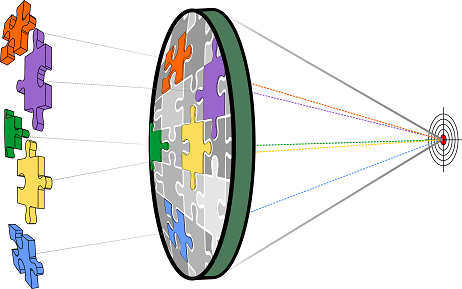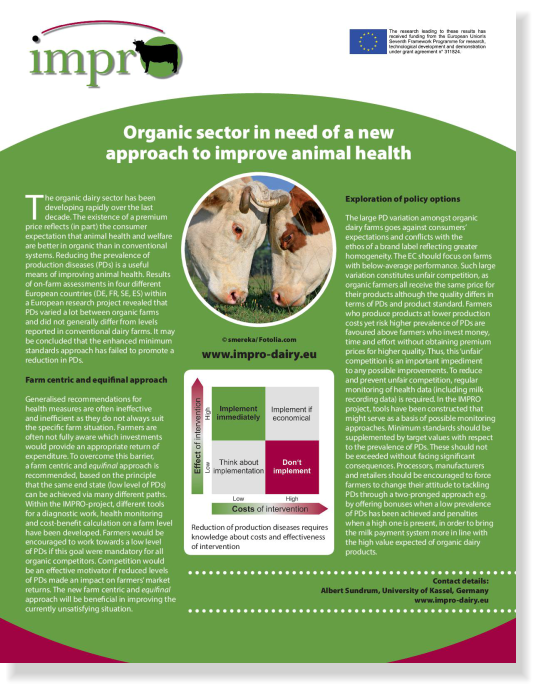
The organic dairy sector has developed rapidly. Premium prices reflect the consumer expectation that animal health is better in organic than in conventional systems. The interdisciplinary EU-project IMPRO aimed to assess the current state and investigate options to reduce the prevalence of production diseases (PDs). Results of on-farm assessments in four different European countries (DE, FR, SE, ES) revealed that PDs varied a lot between organic farms and did not generally differ from levels reported in conventional dairy farms.
 Farmers often do not know which measure they should prioritize in order to combat particular problems and which investments could provide an appropriate return on capital. Within IMPRO, a farm centric and equifinal approach has been developed, based on the principle that the same end state (low level of PDs) can be achieved via different paths. The new approach to provide ways of reducing selected PDs (mastitis, metabolic and fertility disorders, and lameness) is based, inter alia, on an impact matrix as a participatory concept (involving farmer, veterinarian and advisor) for diagnostic work. The feedback from the project was encouraging and provided positive incentives for further development of a farm level diagnostic approach.
Farmers often do not know which measure they should prioritize in order to combat particular problems and which investments could provide an appropriate return on capital. Within IMPRO, a farm centric and equifinal approach has been developed, based on the principle that the same end state (low level of PDs) can be achieved via different paths. The new approach to provide ways of reducing selected PDs (mastitis, metabolic and fertility disorders, and lameness) is based, inter alia, on an impact matrix as a participatory concept (involving farmer, veterinarian and advisor) for diagnostic work. The feedback from the project was encouraging and provided positive incentives for further development of a farm level diagnostic approach.
Additionally, a pilot project was conducted to deal with the question whether the use of homeopathy and phytotherapy holds potential to replace the use of antibiotics in treating bacterial infectious diseases keeping negative side effects to a minimum. Literature reviews revealed that cure rates after treatment with either antibiotics, alternative treatments or a placebo varied greatly between the studies. None of the scientific studies with alternative products has been re-produced. Thus, the use of homeopathic or phytotherapeutic products cannot claim to have a reliable and repeatable effect and a prognostic validity. Effectiveness of treatments in farm practice is highly context-dependent. It requires a lege-artis procedure, including follow-up checks, documentation of the recovery progress, and the involvement of highly skilled people. Otherwise, alternative treatments are at risk to increase health and welfare problems due to lack of therapeutic success and thus extended suffering of diseased animals. The large PD variation amongst organic dairy farms goes against consumers’ expectations and conflicts with the ethos of a brand label reflecting greater homogeneity. The EC should particularly focus on farms with below-average performance. Farmers who produce products at lower production costs yet risk higher prevalence of PDs are favoured above farmers who invest money, time and effort without obtaining premium prices for higher quality. Thus, unfair competition is an important impediment to any possible improvements. To reduce and prevent unfair competition, regular monitoring of health data is required.


